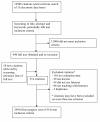Internet-based medical education: a realist review of what works, for whom and in what circumstances
- PMID: 20122253
- PMCID: PMC2825237
- DOI: 10.1186/1472-6920-10-12
Internet-based medical education: a realist review of what works, for whom and in what circumstances
Abstract
Background: Educational courses for doctors and medical students are increasingly offered via the Internet. Despite much research, course developers remain unsure about what (if anything) to offer online and how. Prospective learners lack evidence-based guidance on how to choose between the options on offer. We aimed to produce theory driven criteria to guide the development and evaluation of Internet-based medical courses.
Methods: Realist review - a qualitative systematic review method whose goal is to identify and explain the interaction between context, mechanism and outcome. We searched 15 electronic databases and references of included articles, seeking to identify theoretical models of how the Internet might support learning from empirical studies which (a) used the Internet to support learning, (b) involved doctors or medical students; and (c) reported a formal evaluation. All study designs and outcomes were considered. Using immersion and interpretation, we tested theories by considering how well they explained the different outcomes achieved in different educational contexts.
Results: 249 papers met our inclusion criteria. We identified two main theories of the course-in-context that explained variation in learners' satisfaction and outcomes: Davis's Technology Acceptance Model and Laurillard's model of interactive dialogue. Learners were more likely to accept a course if it offered a perceived advantage over available non-Internet alternatives, was easy to use technically, and compatible with their values and norms. 'Interactivity' led to effective learning only if learners were able to enter into a dialogue - with a tutor, fellow students or virtual tutorials - and gain formative feedback.
Conclusions: Different modes of course delivery suit different learners in different contexts. When designing or choosing an Internet-based course, attention must be given to the fit between its technical attributes and learners' needs and priorities; and to ways of providing meaningful interaction. We offer a preliminary set of questions to aid course developers and learners consider these issues.
Figures


References
-
- Childs S, Blenkinsopp B, Hall A, Walton G. Effective e-learning for health professionals and students - barriers and their solutions. A systematic review of the literature - findings from the HeXL project. Health Info and Libr J. 2005;22(Suppl 2):20–32. doi: 10.1111/j.1470-3327.2005.00614.x. - DOI - PubMed
-
- Coomey M, Stephenson J. In: Teaching and Learning Online: Pedagogies for New Technologies. Stephenson J, editor. London: Kogan Page; 2001. Online learning: it is all about dialogue, involvement, support and control - according to the research; pp. 37–52.
Publication types
MeSH terms
LinkOut - more resources
Full Text Sources
Miscellaneous

